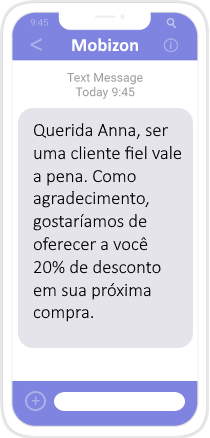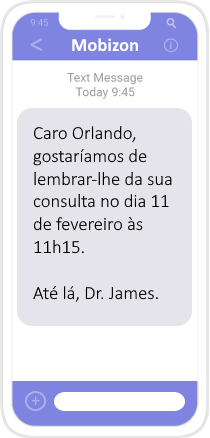
In the past, SMS marketing has fallen into disrepute because it has often been misused for SPAM messages. Today, strict privacy policies are in place that protect consumers and have made SMS marketing a popular, professional form of communication.
Even though, SMS no longer plays a major role in private communication, it is very popular in business communication. In this article we discuss what makes SMS so exciting for marketing and for what purpose you could use SMS.
What are the advantages of SMS?

Studies have shown that most of us are literally glued to our cell phones. More than 40% of Brazilians look at their mobile phone within 15 minutes after waking up. The generation of 18 to 24 year olds checks their mobile phones 56 times a day, on average.
These figures illustrate that the mobile phone is an indispensable part of everyday life and that potential customers can be reached easily by phone because the opening rate of SMS is 82.1%. In comparison, the opening rate of emails is only 24%. Accordingly, the retention rate for SMS is enormously high, as e-mails are often not read for days and SMS are almost always opened immediately.
The range of SMS is therefore enormous (compared to email marketing, organic advertising, social media, PPC). And the recipient does not even need a smartphone, as it is the case with a WhatsApp message, for example.
Data privacy

In order to send short messages correctly, the explicit consent of the recipient is required. For example, you can obtain this very simply using an online form. The customer can enter his data there, select the content he wants to be notified about by SMS and agree to the General Terms and Conditions. His consent is then confirmed with a two-factor authentication.
Get to the point

SMS differ from emails in their limited number of characters. You can use 160 characters in a traditional SMS. This requires you to limit yourself to the most important facts, which is an added value for the recipient, since he does not have to work his way through unimportant information in order to get to the core message. So, find clear words and get to the point.
In addition, an SMS should of course be optimized for mobile devices. For example, you should use short URLs so that the precious number of characters is not wasted by a long link.
Examples of use
Banks use SMS to send verification codes, hairdressers or doctors remind their customers of upcoming appointments and retailers notify their customers when the order is on its way or new goods have arrived. Of course, SMS can also be used for internal communication. For example, you can be notified by SMS as soon as a new user has registered on your site.
Reward Customer Loyalty

Doctor’s appointment reminder




